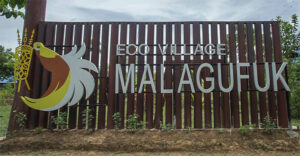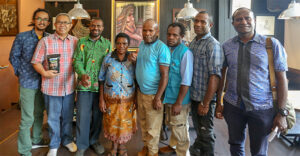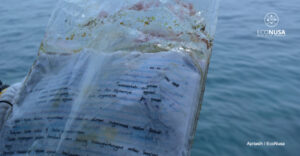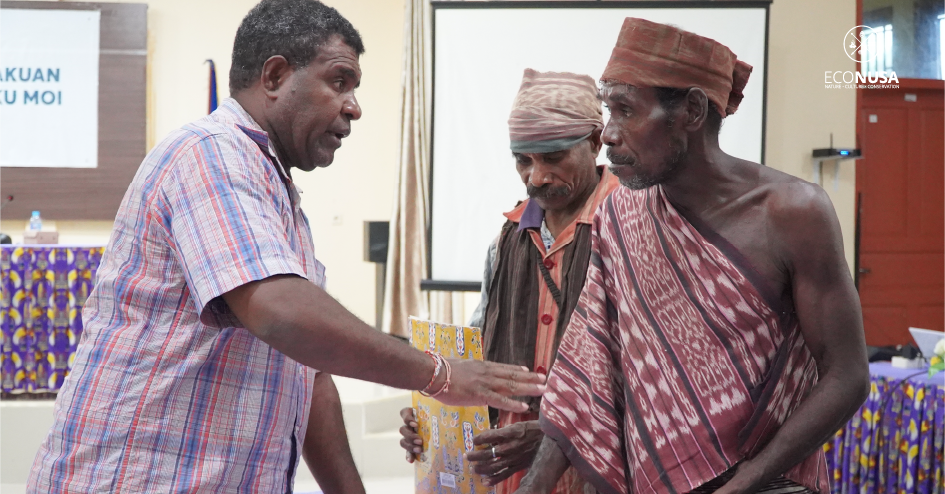
The year 2024 was sweetly welcomed with the submission of seven documents of the Regent Decree (SK) on the Protection and Recognition of Indigenous Peoples and customary territories in Klafyo Village, Konhir District and Waimon Village, Segun District, Sorong Regency, Southwest Papua. The seven documents, which were previously officially approved on December 19, 2023, contain the local government’s recognition of seven clans in the two villages, namely the Blon, Gisim, and Koso clans from Klafyo Village, and the Igip, Malalu, Aresi, and Fadan clans from Waimon Village.
“There are seven clans that got the decree, meaning the government’s recognition of the boundaries (territory) of the indigenous community,” said Luther Salamala, Expert Staff of the Sorong Regent for Community Affairs when interviewed at the Inspectorate Building of the Sorong Regency Office at the momentum of document submission which took place on Thursday, January 18, 2024.
Read also: Building Indigenous Community Resilience Through Taro Commodity
The decree was handed over by Luther Salamala representing the Acting Regent of Sorong, Cliff Agus Japsenang, to seven representatives from each clan. This is certainly welcomed and a really sweet early-year gift for the indigenous people of the clan, considering that the publication and submission of this document is the result of a long journey from the efforts of indigenous peoples fighting for their rights as masters of their customary land.
“The decree for our customary land strengthens our custom and territory. So that our land is not taken by companies. If a company comes, we as indigenous people already have proof (of land ownership) of the decree, and they can’t cheat us anymore. I thank the government and all parties, for giving this customary land decree,” said Yeheskel Malalu, a representative of the Malalu clan.
Yeheskel also said that with this decree, various natural potentials in Waimon Village such as marine products and forest products can be managed properly to create prosperity for the indigenous people there. He hopes that this decree can make the people in Kampung Waimon, especially from the Malalu clan, live prosperously for generations to come.
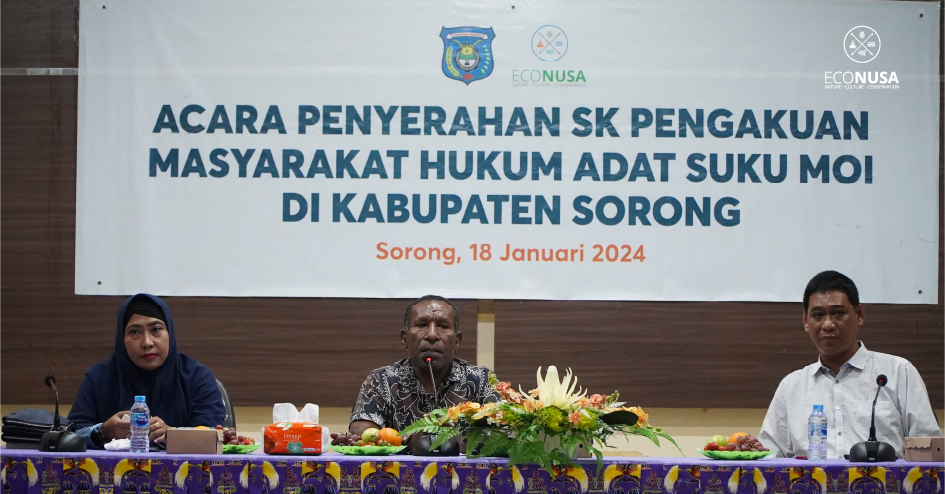
To be successfully recognized by the government of Sorong Regency, indigenous peoples need to meet various requirements that have been regulated. The indigenous community must have a map document of the customary territory, documents of customary assets, potential, history, and customary rules that will apply within the proposed customary territory, and proof of consent from other clans whose territory is directly adjacent to their customary territory. These documents are obtained through various processes, starting from the mapping of customary areas and participatory discussions. After these documents are compiled, the community then needs to hold a customary hearing both internally and with other clans whose territories are adjacent. The hearing is held to reach a mutual agreement, as evidenced by the signatures of the stakeholders on the proposed customary territory map and the minutes of the customary hearing. All proposed documents must also be verified and validated by the Indigenous Peoples Committee.
Read also: Bustar Maitar: Indigenous Peoples are the Frontliner of Nature Protection
Recognizing the importance of indigenous peoples’ sovereignty to realize self-reliance and welfare, EcoNusa Foundation supports the process. EcoNusa assists indigenous peoples in mapping their customary territories, facilitates participatory discussion processes, and proposes the establishment of customary territories to the local government. “We must support the welfare of indigenous people so that they can manage their customary land, get benefits and prosper from it, and protect their customary land with their local wisdom,” said Bustar Maitar, CEO of EcoNusa Foundation.
The seven decree documents contain recognition of customary law communities and customary territories of seven clans with a total recognized customary area of 12,157.98 hectares. Three decree documents contain recognition and protection of customary areas located in Klafyo Village, Konhir District, including customary areas of the Blon clan covering 332.70 hectares, and the Gisim clan covering 490.70 hectares. The other four decrees contain the recognition and protection of customary territories for four clans in Waimon Village in Segun District, namely the customary territory of the Igip clan covering 2,353.24 hectares, the Malalu clan with an area of 2,940.39 hectares, the Aresi clan covering 1,806.86 hectares, and the customary land of the Fadan clan with an area of 2,693.58 hectares.
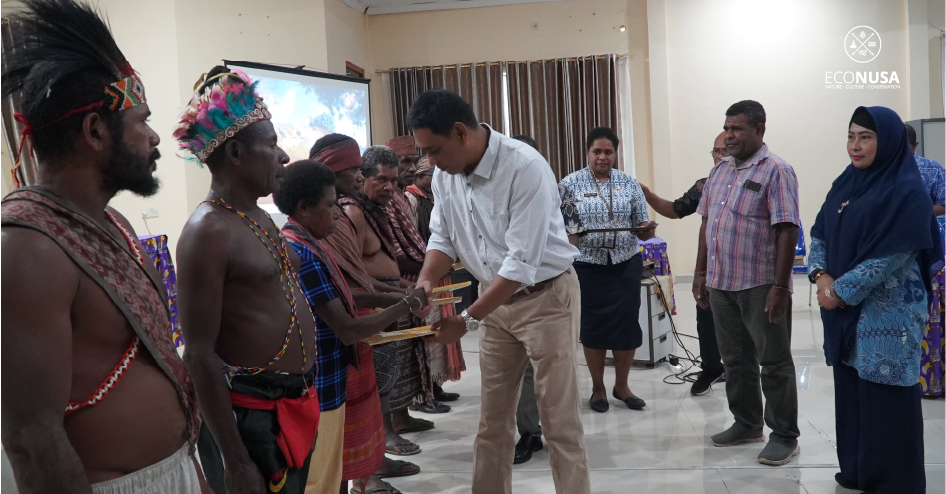
Segun District Chief Yance Nibra expressed his delight at the handover of the decree, especially for the indigenous community in Waimon Village. “We hope this can inspire communities in other places to map their customary territories. With this, indigenous people can protect the potential of natural resources on their land, prevent unwanted things from happening, and can make the community prosperous,” said Yance.
The struggle of indigenous peoples to become masters in their land is something that must be supported. Tanah Papua with its rich natural resources should be well managed by indigenous peoples with a set of local wisdom that has long existed and practiced. If indigenous peoples are given and protected the right to manage their customary territories, it is hoped that this can bring prosperity and improve their economy and standard of living both now and in the future.
“We hope that after they (indigenous peoples) have rights, it is only then how they manage their natural potential well, to improve their economy, and still protect their nature,” Luther concluded.
Editor: Nur Alfiyah


